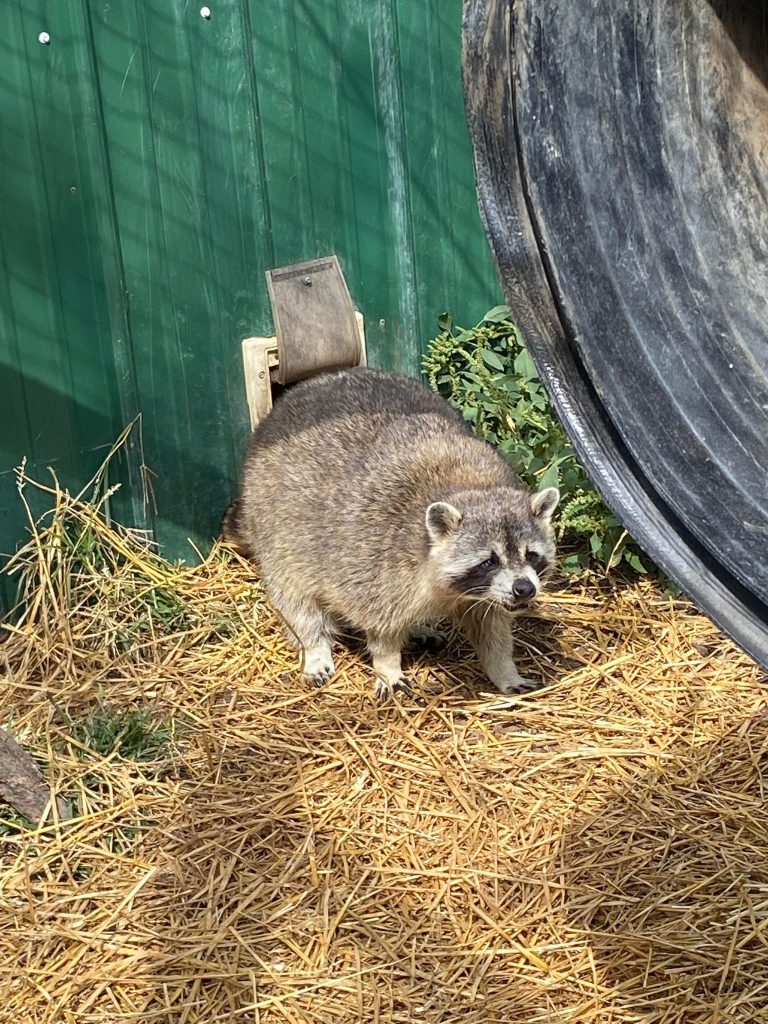By Carly Nichols
A heavy-set elderly dog, appearing to be an assortment of many breeds, sways toward me as I sit at a wrought iron patio table. He wobbles a little with every step to give me an approving sniff before he lays down under a chair. I assume he’s resuming a nap he was already taking when I arrived. His name is Earl, and he is just one of the many friendly faces at the CSC Farms Rescue Haus in Hartford City.
Judi Crouch and her son, Zach, have been running the farm for many years as a nonprofit wildlife rehab center. It also serves as a location that rescues exotic and livestock animals throughout Indiana. “CSC” is a combination of the initials of the last names of Judi’s children, and “Rescue Haus” is an homage to a friend who passed away. She had owned a facility by that moniker, and they felt moved to keep the name alive through their rescue.
You may wonder why you’ve never heard of CSC, but the answer is simple. It’s a game of numbers. “We get animals from all over the state, and we take all mammals, reptiles, and amphibians,” Judi said. So, there isn’t much time for advertising when you can potentially have 700 to 800 animals at a given time and only five people to run the show.
When the pandemic hit, the rescue’s traffic increased considerably. Judi explained that they would have cars lined up and down the road, dropping off animals. Each vehicle would wait its turn, pull in to drop off an animal, and then pull out only for another car to replace it immediately. The effects of Covid have been widespread and publicized when it comes to people, but repercussions like animal surrender are not so easily recognizable as fallout from this pandemic.
Even during periods of normalcy, the reality is there are times of the year that are more burdened with animal surrenders than others. Sadly, these are moments when animals are purchased rashly as presents, like bunnies at Easter. These animals are then handed over when the owners realize they don’t have the time, money, or know-how to take care of them.
Unfortunately, this happens often in this field. Zach and Judi mainly want you to know, “Educate yourselves before you get an animal.” Zach reiterates that taking the time to do the research will help you make a truly informed decision and keep an extra animal from being rehomed or surrendered. The farm might receive 15 to 20 calls a day in the spring for animals no longer suitable for the families to keep. It’s a heartbreaking scenario that can be avoided.
Though they handle many of those cases, most of the animals at the Rescue Haus are wildlife. They offer these animals sanctuary, food, and rest as they recover. When the animals are ready, they release into the wild when possible. Some animals will never be eligible for release and will spend the rest of their days comfortably on the farm.
The good news is that even though some animals cannot be released or succumb to injuries, there are more happy endings than not. Zach said, “The amount we release is significant compared to the amount we can’t help.” Ultimately, their main goals are rehabbing and releasing as many animals as possible.
You might be wondering if there are any animals they don’t work with at the rescue. Remember my new friend Earl? They don’t work with dogs, cats, or birds native to Indiana. There are other options for those animals, like a local bird facility, to which they can refer. Earl is a family pet and apparent front door guardian that helps them by keeping one napping eye on things.
Even though Earl is a great helper, the CSC Farms Rescue Haus could use a little more help. The rescue has many cages to clean, dishes to wash, and animals to feed. It can be overwhelming for such a small crew to handle this much work, and having more volunteers would be ideal.
If the Rescue Haus is the type of place your heart calls to, but you cannot offer help by physically volunteering, they also need donations. Donations for a place like this can come in many forms. The farm has an Amazon wish list on its Facebook page that allows people to donate items the animals need from the comfort of the donator’s home. The facility also has an easy-to-use PayPal link on its Facebook page, enabling you to donate cash online. Checks can also be written to CSC Farms Rescue Haus and mailed to 4593 E. 500 S., Hartford City, IN 47348. Any donations made to the farm are tax deductible, and you will receive documentation for tax purposes.
Judi and Zach initiate fundraisers during the year when time permits. However, it can be difficult because they don’t want to burden community members more during certain times of the year. Nor do they want to compete with the teams and groups working on fundraisers for their programs. They offer the option to sponsor an animal or enclosure throughout the grounds, another unique way you can donate to the facility.
Judi and Zach know the impact donations can have on a project, program, or organization. They both ensure that they give back to the community anytime they can. Zach explained, “People need people, and if you can be anything in this world, be kind.” This mantra seems to be the guiding light that fuels the CSC Farms Rescue Haus.
If you want to keep up with the CSC Farms Rescue Haus, the best way to do that is to like and follow it on Facebook. Or, if you would like to contact Judi or Zach directly to help volunteer, donate, or learn more about how you can help, please call Judi at 765-209-0848 or Zach at 765-717-5941.
CARLY NICHOLS is the marketing and communication coordinator at Jay County REMC.




